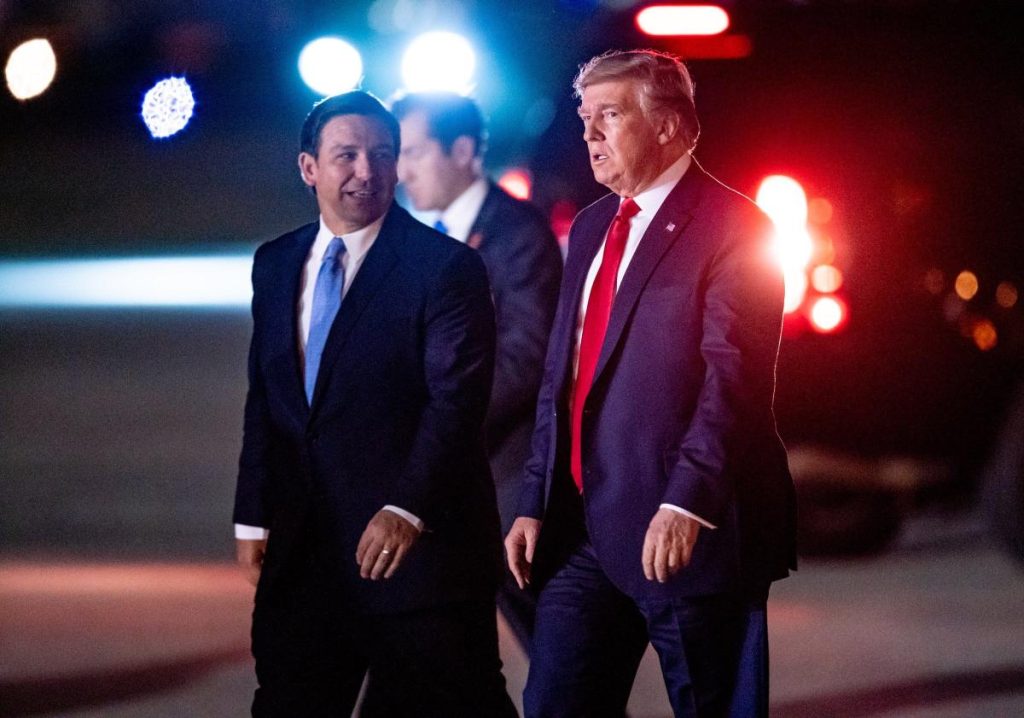Ron DeSantis, the governor of Florida, pushed for a draconian six-week abortion ban as part of his presidential run, hoping to out-extreme Donald Trump and other GOP candidates. The Florida Supreme Court recently approved this ban, which will take effect in 30 days. However, the court also ruled that an amendment protecting abortion rights will be on the Florida ballot in November, giving voters the opportunity to strike down DeSantis’ ban. This unexpected turn of events may have negative repercussions for Trump, who will face difficult choices regarding his stance on the ban.
The Florida Supreme Court’s decision to uphold the six-week abortion ban essentially reinstates the state’s existing 15-week abortion ban. This means that, for Floridians, a six-week ban is essentially a complete ban on abortion, as most people are unaware of their pregnancy before six weeks. The ban will severely limit abortion access in the South and may have far-reaching consequences on women’s reproductive rights. The organization Floridians Protecting Freedom has expressed concerns about the ban’s impact on patients and healthcare facilities in the region.
As the November election approaches, Trump will find it challenging to navigate the issue of the Florida ballot that includes an amendment protecting abortion rights. With women in the state losing their abortion rights due to DeSantis’ ban, which was upheld by conservative judges appointed by Trump, the former president will have to confront the consequences of his actions. Despite attempting to straddle the issue and make vague promises about negotiating a national abortion ban, Trump will face a difficult battle in addressing the Florida ballot issue.
A recent Fox News poll revealed widespread support for abortion access, with a majority of voters favoring a nationwide law guaranteeing access to abortion. The poll found that 59% of voters believe abortion should be legal in all or most cases, and 54% oppose a 15-week federal abortion ban. This data reflects a shift in public opinion on abortion rights, which may pose challenges for politicians, including Trump, who are attempting to navigate this contentious issue. Despite these obstacles, Trump will have to find a way to address the issue of the Florida ballot in the upcoming election.
Since the overturning of Roe v. Wade and the enactment of restrictive abortion bans, this issue has been a losing one for Republicans. Trump’s handling of the abortion debate has been fraught with contradictions and vague promises, making it difficult for him to build a coherent stance on the issue. DeSantis’ actions, which have led to the approval of a six-week abortion ban in Florida, have further complicated the political landscape. With the upcoming election and the Florida ballot amendment, the stakes are higher than ever, and Trump will need to navigate the issue carefully to avoid alienating voters.
In conclusion, Ron DeSantis’ six-week abortion ban in Florida has far-reaching implications for women’s reproductive rights and political dynamics in the state. The unexpected approval of the ban by the Florida Supreme Court has set the stage for a contentious debate on the issue, with Trump caught in the crossfire. As the November election approaches, the Florida ballot amendment will force politicians, including Trump, to take a clear stance on abortion rights. The outcome of this debate will have significant implications for the future of abortion policy in the state and the country as a whole.


